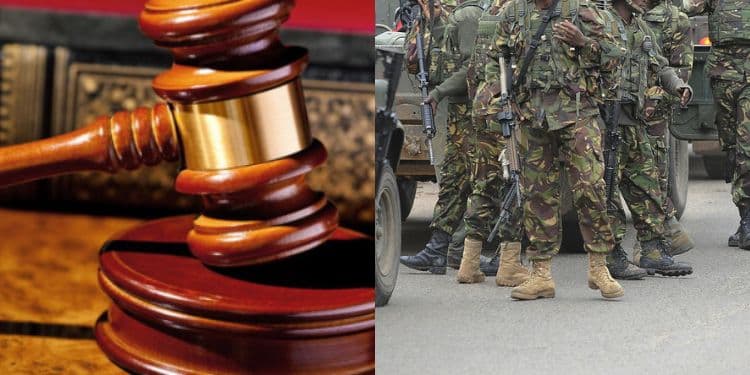We're loading the full news article for you. This includes the article content, images, author information, and related articles.
A landmark Court of Appeal ruling affirms constitutional religious freedoms within Kenya's disciplined forces, ordering the state to compensate a former soldier fired for observing his Saturday Sabbath.

NAIROBI, KENYA – The Court of Appeal has ordered the Kenya Defence Forces (KDF) to pay KSh8 million to a former soldier, Polycarp Miyogo, for unlawfully dismissing him over his observance of the Saturday Sabbath. In a significant decision delivered on Friday, November 8, 2025, the court affirmed that Mr. Miyogo's constitutional right to religious freedom was violated, setting a precedent on the balance between military discipline and individual liberties.
The ruling concludes a legal battle that began in 2012 when Mr. Miyogo, a devout Seventh-day Adventist (SDA), was discharged from the military. According to court documents, the dismissal followed an incident on May 31, 2012, when his supervisor denied his request for leave to attend Sabbath worship, a weekly religious observance central to his faith. This was reportedly the first time such a request had been denied in his ten years of service. Following disciplinary proceedings for failing to report for duty, he was imprisoned for 42 days and subsequently dismissed on the grounds that his services were “no longer required.”
Mr. Miyogo first challenged his dismissal at the Employment and Labour Relations Court (ELRC), arguing that the KDF's actions infringed upon his fundamental rights guaranteed under the Constitution of Kenya, 2010. His petition cited violations of Article 32 (Freedom of conscience, religion, belief, and opinion), Article 27 (Equality and freedom from discrimination), and Article 47 (Fair administrative action). The ELRC ruled in his favour, declaring the imprisonment and discharge unconstitutional.
However, the government, represented by the Attorney General, the Cabinet Secretary for Defence, and the Chief of Defence Forces, appealed the decision. Their central argument was that Mr. Miyogo's refusal to work on a Saturday constituted insubordination, not religious persecution. They contended that military discipline is paramount for operational readiness and that accommodating individual religious practices could undermine unit cohesion and command structure. The state's lawyers also cited Section 255 of the KDF Act, which permits the discharge of an officer whose services are “no longer required.”
In its majority judgment, the Court of Appeal, led by Justice Pauline Nyamweya, upheld the lower court's findings. The appellate judges ruled that the right to worship under Article 32 of the Constitution cannot be limited for military personnel without a compelling justification, such as a direct threat to operational readiness or national security, which the KDF failed to demonstrate in this case. “The refusal to permit him to worship on Saturdays in the circumstances of this appeal infringed the respondent's right to religious belief and worship under Article 32 of the Constitution,” the court found.
The court awarded Mr. Miyogo a total of KSh8 million in damages. This comprises KSh5 million for the violation of his religious rights and KSh3 million in exemplary damages for his unlawful imprisonment. The court also ordered that he be paid 12 months' salary for the unlawful termination. However, the court set aside an earlier award for his pension, noting that he had not completed the mandatory 12 years of service required for pension eligibility.
This ruling has significant implications for Kenya and the East Africa region, reinforcing the supremacy of the Constitution even within hierarchical and disciplined institutions like the military. It challenges the armed forces to review their internal regulations to ensure they provide reasonable accommodation for diverse religious practices, so long as they do not impede essential duties. The decision is a victory for religious freedom advocates and human rights organizations who have long campaigned for the protection of constitutional rights within the security sector.
The Seventh-day Adventist Church in Kenya has previously been involved in legal cases to protect the right of students to observe the Sabbath in educational institutions. This ruling extends that principle to the workplace, including the armed forces. As of Monday, November 10, 2025, the Kenya Defence Forces and the Attorney General's office had not issued a public statement in response to the Court of Appeal's final verdict. FURTHER INVESTIGATION REQUIRED on their official response and any potential policy changes within the KDF following this judgment.
The case of Polycarp Miyogo serves as a critical reminder of the ongoing dialogue between state security imperatives and the fundamental rights of citizens, a conversation that resonates across East Africa as nations work to modernize their institutions while upholding democratic values enshrined in their constitutions.
Keep the conversation in one place—threads here stay linked to the story and in the forums.
Sign in to start a discussion
Start a conversation about this story and keep it linked here.
Other hot threads
E-sports and Gaming Community in Kenya
Active 9 months ago
The Role of Technology in Modern Agriculture (AgriTech)
Active 9 months ago
Popular Recreational Activities Across Counties
Active 9 months ago
Investing in Youth Sports Development Programs
Active 9 months ago